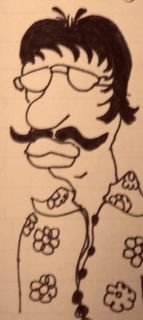After a little reading last night and early this morning, I've finished the first part of AGAINST THE DAY. As a form of entertainment, the book is awesome...but as a "reading project" the book is heaven. I imagine a grad student could toil away for years at this book, and STILL have things to say about it. There are so many things to research, so many little nooks and crannies.
The first thing on my agenda: the myriad of (sub)plots. In the 100+ pages I've read, there are probably about five to seven novels worth of plot. As I mentioned previously, Pynchon is really good at giving ALL of his characters interesting back stories. While I think he treats his subjects more than fairly (Pynchon makes his two page summaries as vivid and life like as a novel), I think any number of lesser writers (myself included) could take any of his little threads and weave a longer (but not necessarily better) work. A good example of this is the character Webb Traverse. When Webb is introduced to us (via another character we've already met...this links Webb to pretty much ALL the other, numerous characters thus encountered--proving the notion that in Pychon's world...it really is a "small world after all.") the novel quickly turns to Webb and his life leading up to his introduction. We see Webb grow fond of dynamite and explosions, gain employment in a mine, meet his wife. Then Webb has a life changing experience. Ripped from Tarintino's PULP FICTION, a pool table explosion (don't ask) triggers a massive gun battle, that Webb miraculously escapes unharmed. Staggering around outside, he meets an anarchist Reverend who convinces Webb (along with the rest of his flock) to fight the tyrannical power of Capitalism via bombs. Basically, Webb becomes a terrorist. We see Webb and an accomplice blow up a rail road bridge--is Pynchon making a commentary on today's modern terrorism? Webb leads a double life-his wife and children know nothing of his anarchist secret identity. Webb teaches his children to respect (and love) the awesome power of explosives. Growing up in a mining town at the turn of the century, this alarms no one (except, perhaps for Mayava his wife).
Now, that little snippet of plot exists perfectly in AGAINST THE DAY, but could also (I think) work all by its lonesome as a stand alone novel. Even more so when Webb's children slowly move Pynchon's narrative eye away from Webb. One of Webb's sons, Kit, grows up and studies not explosives...but that new marvel-electricity. While working as a low level tech for Nikolai Tesla (the mad genius Serb who invented the radio and A/C current we use today), Kit becomes wrapped up in another larger plot thread involving Scaresdale Vibe (and the Chums of Chance benefactor Professor Vanderjuice). An emissary of Vibe's makes young Kit an offer he can't refuse--Kit gets to go to Yale on Vibe's dime. He'll get to study electricity all he wants for free, but then he has to work for the wealthy tycoon (and his nefarious schemes). Naturally, Webb doesn't like the idea that his son is going to align himself with the very Capitalist forces he's spent his adult life fighting (and blowing up).
The "Small World" that Pynchon crafts in AGAINST THE DAY is very similar to the one he created in VINELAND. There are dozens of characters, thus far, and nearly all of them can be related to any of the others. Kinda like a literary version of the 6 Degrees of Kevin Bacon game people like to play at parties. What does his all mean? Does Pynchon believe in fate (or a community fate)? Is he an advocate of bizarre chance? Or, it is destiny that he's pushing? I suspect, that in typical complexity, he's gunning for all of the above (and probably some I can't even fathom). All writers are like God in many ways for their characters (see STRANGER THAN FICTION). I guess in that regards, Pynchon is just pushing his little action figures across the cardboard stage he decided to call AGAINST THE DAY. There is no need to rationalize the "why" or "how likely is it that so-and-so had a run in with so-and-so..." and yet, in real life I find examples very similar to the ones I chuckle at in the novel. Peer Networking sites like MySpace.com and Facebook can (and in my case often do) show links between people that, like a bridge can link several distant (geographically or otherwise) people. Perhaps the "small world, after all" or Pynchon's fiction isn't so strange after all. Maybe it's just another example of art imitating life.
Lastly, speaking of characters and strange-ness...I thought the reading/talking dog Pugnax was going to be the hands down weirdest character--but I was wrong. The photographer, Merle Rideout has a GHOSTBUSTER moment and while trying to rid a town of lightning (as a door-to-door lightning rod salesman) he meets "Skip." Skip is a self-aware ball of electrical energy. Part of a phenomenon of ball lightning plaguing a peculiar small mountain town. Merle gives up the sales job, and agrees not to force Skip into the ground ("it's no fun there" he tells Merle). So, instead of grounding the stray electricity, Merle and his daughter Dally adopt it...sort of like a pet or little, static-y brother. Eventually, a powerful electrical storm calls Skip back into the collective mass of electrical energy, where he tells Merle he'll be disassembled or reabsorbed by the collective unit of energy. Fascinating.
Until next time.
Friday, March 23, 2007
Subscribe to:
Post Comments (Atom)






No comments:
Post a Comment